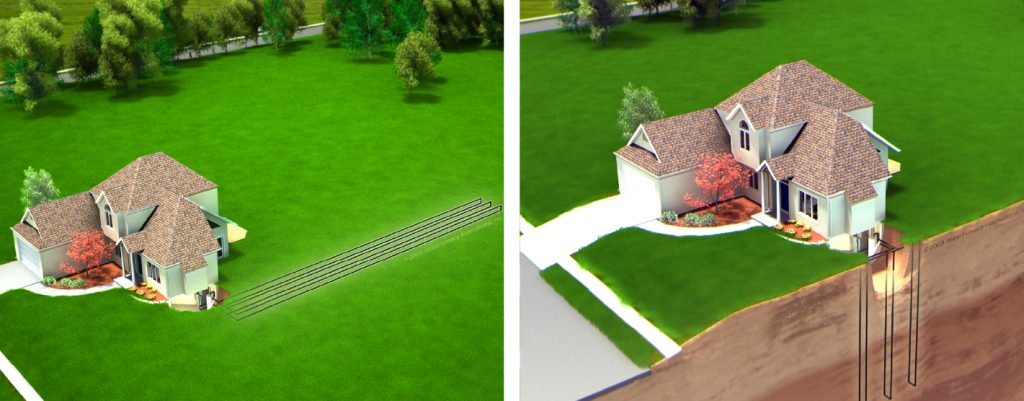As a leading installer of geothermal systems in our area, we frequently are asked, “Can geothermal pipes freeze in extreme cold?” If you live in central and northern Indiana, where winters can be harsh, and are considering a geothermal system or have purchased a home with one, the concern is understandable. However, the reassuring answer is no. Thanks to meticulous design and engineering, geothermal systems are built to withstand severe temperatures without the risk of pipes freezing. However, it’s natural to have concerns if you have a geothermal system and notice frost or ice forming on parts of your geothermal loop.
How Geothermal Systems Perform in Extreme Cold
Geothermal heating in extreme cold is incredibly reliable. Unlike air-source heat pumps that rely on extracting heat from the air, geothermal systems pull warmth from underground, where temperatures remain stable year-round. Even when the air outside drops below zero, the ground beneath your home typically stays between 50 and 60 degrees Fahrenheit. Warmer ground temperature means your geothermal system still has a dependable heat source to draw from, even in the harshest winter conditions.
During extended cold spells, it’s normal for the ground loop’s temperature to decrease. The loop fluid may reach temperatures around 30 degrees or lower; however, geothermal heat pumps are equipped with de-icing mechanisms to maintain optimal performance.
Why Do Some Geothermal Pipes Develop Ice or Frost?
It’s not uncommon for homeowners to observe frost or ice on exposed geothermal loop pipes or the loop pump assembly indoors. While this might seem alarming, it’s typically a harmless occurrence resulting from:
Cold Loop Temperatures: As heat is extracted, the circulating fluid cools, sometimes nearing freezing points.
Airborne Moisture: Warm indoor air can condense upon contact with the cold surfaces of loop pipes. If ambient temperatures are low enough, this condensation freezes, forming frost.
Insulation Variations: While most components are insulated, certain parts, like pump assemblies, might lack full coverage, leading to visible frost in those areas.
Built-in Protections Against Freezing
A common misconception is that geothermal pipes could freeze solid and burst like a water pipe. In reality, geothermal systems incorporate several safeguards to prevent this from happening, including the following:
Antifreeze Solution: Closed-loop systems circulate a special antifreeze fluid that allows the system to operate effectively at low temperatures without freezing.
Underground Placement: Most underground loop pipes are below the frost line, where temperatures remain steady and above freezing.
Efficient Heat Transfer: Even when the loop temperature drops, the heat pump can still extract sufficient warmth to heat your home effectively.

What to Expect During Extreme Cold Weather
In Indiana, geothermal systems can typically maintain indoor temperatures of 70 degrees Fahrenheit when the outside temperature is around 2 degrees. However, during unusually severe cold spells—such as temperatures plunging to -15 degrees with high winds—your system may struggle to maintain its usual temperature.
Temporary struggles do not mean your system is failing or needs professional service. An indoor temperature drop of a few degrees during a historic cold spell is normal. Increasing the system’s size to handle these rare events would make it oversized and inefficient for most winter days.
The Role of Supplemental Heating
During exceptionally cold periods, your geothermal system may activate a backup heat source, like electric resistance heating. While some homeowners worry this might reduce efficiency, it’s important to note:
- Occasional Use: Supplemental heating operates only during extreme conditions.
- Primary Efficiency: Throughout the winter, your geothermal system efficiently manages the majority of heating.
- Overall Benefit: Even with occasional backup activation, geothermal systems remain significantly more efficient than traditional HVAC setups.
Trust Precision Comfort Systems for Geothermal Heating Even in Freezing Temperatures
So, can geothermal pipes actually freeze? As long as qualified professionals install and maintain your system, freezing is not a real risk. While frost or ice on some exposed pipes might look concerning, it is entirely normal and does not indicate a problem. Your geothermal heating and cooling system can handle extreme temperatures efficiently, keeping your family warm and comfortable all winter long.
If you have any concerns about your system’s performance during extreme cold, reach out to Precision Comfort Systems. Our experts specialize in geothermal technology, have the most geothermal experience in Indiana, and can guide you to ensure your system operates at peak efficiency.
